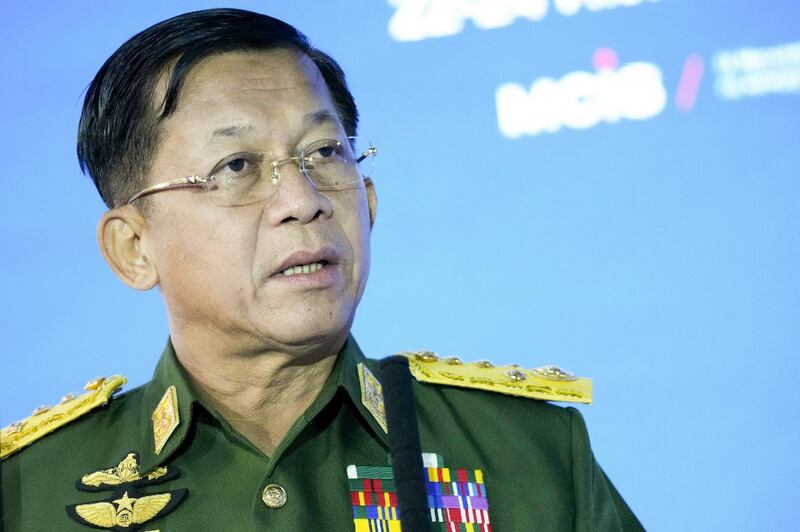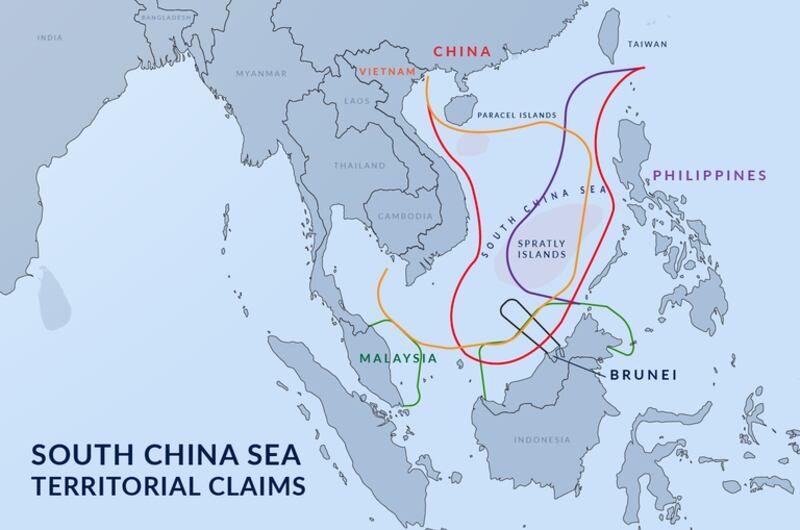Leaders from some 50 Asian and European countries called on Myanmar Friday to return to the democratic transition that was halted by a military coup, release arbitrarily detained prisoners, and accept a Southeast Asian envoy to mediate the 10-month-old political crisis.
Association of Southeast Asian Nations member Myanmar did not attend the two-day virtual Asia-Europe Meeting -- the third time the ASEAN had sidelined junta leader Sr. Gen. Min Aung Hlaing over the violence and repression in the wake of the Feb. 1 overthrow of the country’s elected government.
“Leaders expressed deep concerns on the situation in Myanmar and affirmed their strong support for ASEAN’s efforts to de-escalate the crisis,” the group said in a statement after the meeting, hosted by Cambodia, the 2022 ASEAN chair.
“They called on all parties concerned in Myanmar to engage in peaceful dialogue, immediately cease violence in Myanmar and exercise utmost restraint; and called Myanmar for the early release of all those arbitrarily detained, including foreigners, and return to the path of democratic transition, national reconciliation and sustainable development,” said the statement.
The sticking point – which also kept Myanmar out of an ASEAN-China special summit this week and the ten-member bloc’s leaders’ meeting in Brunei last month -- was the military regime’s failure to honor a pledge made last April to allow an ASEAN special envoy to meet deposed civilian leader Aung San Suu Kyi and lawmakers ousted in February’s coup.
Friday’s statement said the ASEM leaders “urged Myanmar to facilitate the visit of the ASEAN Special Envoy to meet all parties concerned.”
Asked about the sub of Min Aung Hlaing by ASEAN, Maj. Gen. Zaw Min Tun, the junta spokesman told RFA: “Our stand is clear that if the one who truly and rightfully represents the nation is not allowed to attend, we won’t attend it,”
“If there were objections regarding the one who represents the nation, or he were not allow to attend, or it treats us with downgraded status, we have no reason to attend,” he added.
The civilian death toll since the military takeover is nearly 1,300 while more than 7,000 people remained detained, according to the Thailand-based Assistance Association for Political Prisoners. Hundreds of thousands are internally displaced in the country of 54 million people, amid food shortages and the coronavirus pandemic.

South China Sea
The Asian and European leaders, making the 25th year of the grouping, did not specifically refer to territorial disputes in the South China Sea, but stated a shared commitment to "maintaining peace, stability and ensuring maritime security and safety, to uphold freedom of navigation and overflight, unimpeded economic activities" at sea.
The summit statement, which did not mention China, urged nations to act in “full compliance with international law, in particular the UN Convention on the Law of the Sea (UNCLOS), in the interest of all.”
At a leaders retreat Friday, Philippine President Rodrigo Duterte brought up the issue of the South China Sea for the second time in a week.
He did not mention China or Beijing by name, but his comments came after he publicly rebuked China at an ASEAN-China meeting on Monday for Chinese coast guard ships firing a water cannon on Filipino supply boats in the South China Sea.
ASEAM leaders’ renewed commitment to open and inclusive multilateralism and the rule of law as “exactly what we need in this time of profound change and uncertainty,” Duterte said.
“Nowhere is this more evident than in the Asia-Pacific. Ours is a region that is full of promise but fraught with potential flashpoints. These include disputes in one of the world’s most important sea lanes of communication,” a statement issued by the president’s office quoted him as saying.
“There can be no other acceptable basis for a just maritime order but the law, particularly the 1982 United Nations Convention on the law of the sea,” he said.
ASEAN members Brunei, Malaysia, the Philippines, and Vietnam – as well as Taiwan – all claim parts of the South China Sea but China cites historical rights to almost 90 percent of the sea despite rejection by international law.

Reported by RFA's Myanmar Service and by BenarNews, an RFA-affiliated online news service. Written in English by Paul Eckert.
